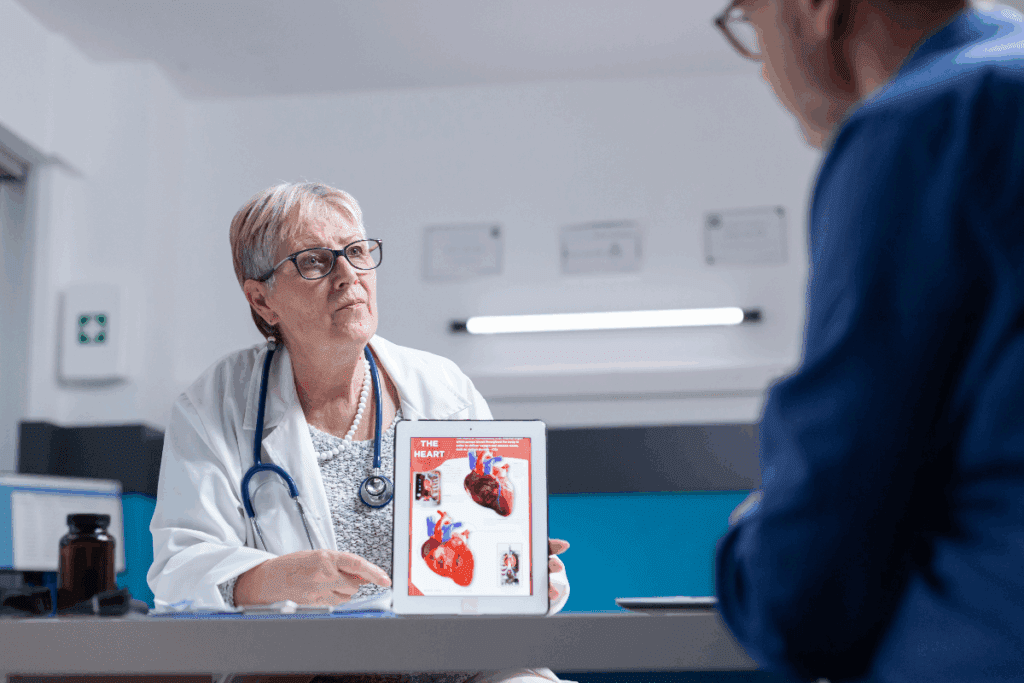Last Updated on November 25, 2025 by Ugurkan Demir

Finding the right care for heart rhythm disorders is key. At Liv Hospital, we offer electrophysiology services with a focus on you. Our team brings top-notch care to your area.
Our specialists are here for you, caring for arrhythmias like atrial fibrillation and ventricular tachycardia. We use state-of-the-art technology to help you live a healthier life.
We provide cardiac electrophysiology services to help you manage your heart health. Our team works with you to find the best treatment for your heart rhythm disorders.

Heart rhythm disorders, or arrhythmias, affect millions globally. They significantly impact people’s lives. These disorders happen when the heart’s rhythm is disrupted, causing irregular heartbeats.
As arrhythmia specialists, we know how vital it is to understand these disorders. Atrial fibrillation (AFib) is a common one. It’s marked by rapid and irregular heartbeats.
There are many types of cardiac arrhythmias, each unique. Atrial fibrillation, for example, can cause dizziness, shortness of breath, and palpitations.
AFib affects over 33 million people worldwide, making it a big health issue. “The prevalence of AFib is expected to increase in the coming years due to an aging population and rising comorbidities,” says a leading cardiac arrhythmia specialist.
Certain factors can raise the risk of arrhythmias. These include age, high blood pressure, heart disease, and a family history of arrhythmias.
It’s important to know the warning signs of arrhythmias. Common symptoms include:
If you’re experiencing these symptoms, see a heart arrhythmia specialist or arrhythmia specialists for treatment.
Understanding arrhythmias and their risk factors is key to managing them. As cardiac arrhythmia specialists, we’re dedicated to providing top-notch care for those with heart rhythm disorders.

The field of electrophysiology cardiology is growing fast. It offers specialized care for complex heart rhythm disorders. As we learn more about arrhythmias, the role of electrophysiologists in cardiac care becomes clearer.
Electrophysiologists are cardiologists with extra training. They focus on diagnosing and treating heart rhythm disorders. Their skills help them give targeted care for complex arrhythmias.
Electrophysiologists are key in managing cardiac arrhythmias. They use advanced tools and treatments. Their training lets them:
Dr. Andrea M. Russo, a well-known electrophysiologist, said, “The field of electrophysiology is always changing. New technologies and techniques help improve patient care.”
“Advances in mapping technology have greatly improved our ability to diagnose and treat complex arrhythmias.”
General cardiologists can handle many heart issues. But, there are times when seeing an electrophysiologist is better. This is true for patients with complex or recurring arrhythmias, those who haven’t responded to initial treatments, or those with inherited arrhythmia syndromes.
Key signs for seeing an electrophysiologist include:
Knowing when to seek specialized care helps patients get the right treatment. This improves their outcomes and quality of life.
At the heart of diagnosing arrhythmias are advanced electrophysiology services. They use cutting-edge tools for accurate diagnoses and effective treatment plans. This helps manage various heart rhythm disorders.
Electrocardiograms (ECGs or EKGs) record the heart’s electrical activity briefly. They spot arrhythmias and other heart issues by showing the heart’s electrical signals. Holter monitoring, a portable device, records heart activity for 24 to 48 hours. It gives a detailed look at heart rhythm over time.
Both ECGs and Holter monitoring are non-invasive and painless. They are key first steps in diagnosis. They help our electrophysiologists check heart rhythm patterns, find irregularities, and plan the next steps in treatment.
Electrophysiology Studies (EPS) are more detailed procedures. They involve using catheters through veins to reach the heart. These catheters record the heart’s electrical signals, pinpointing arrhythmia sources. EPS is great for complex arrhythmias and planning treatments like catheter ablation.
During an EPS, our electrophysiologists can create arrhythmias in a controlled setting. This allows for precise diagnosis and mapping of the heart’s electrical pathways. This info is key for targeted treatment plans.
Advanced cardiac mapping technologies are used with EPS. They create detailed, three-dimensional maps of the heart’s electrical activity. These maps show abnormal electrical activity, guiding treatments like catheter ablation with precision.
By combining EPS with advanced cardiac mapping, we get a clearer picture of complex arrhythmias. This integrated approach helps us create effective, personalized treatment plans for heart rhythm disorders.
| Diagnostic Tool | Description | Primary Use |
| Electrocardiogram (ECG/EKG) | Records heart’s electrical activity over a short period | Initial assessment of heart rhythm |
| Holter Monitoring | Portable device recording heart activity over 24-48 hours | Long-term monitoring of heart rhythm |
| Electrophysiology Studies (EPS) | Invasive procedure recording heart’s electrical signals | Diagnosing complex arrhythmias and planning treatment |
| Advanced Cardiac Mapping | Creates 3D maps of heart’s electrical activity | Guiding treatments like catheter ablation |
Catheter ablation is a new way to treat arrhythmias without surgery. It helps the heart beat normally again. This method is better than long-term medicines and surgery for many heart rhythm problems.
This procedure uses thin tubes called catheters to fix the heart’s electrical issues. Here’s how it works:
Benefits of Catheter Ablation: It can make symptoms better, improve life quality, and sometimes stop the need for medicines.
Catheter ablation helps with many arrhythmias, including:
How well it works depends on the arrhythmia, the patient’s health, and any heart disease.
| Arrhythmia Type | Success Rate of Catheter Ablation | Typical Recovery Time |
| Atrial Fibrillation | 60-70% | 1-3 days |
| Supraventricular Tachycardia (SVT) | 90-95% | 1-2 days |
| Ventricular Tachycardia | 50-70% | 2-5 days |
Catheter ablation is a big step forward in treating arrhythmias. It gives patients a chance to control their heart health again. Always talk to a heart specialist to see if it’s right for you.
Advanced cardiac devices are key in managing heart rhythm disorders. They help improve the quality of life for many patients. These devices treat various heart conditions, ensuring the heart beats right.
Pacemakers are small, implantable devices that control the heartbeat. They send electrical impulses to make the heart muscle contract. They mainly treat bradycardia, when the heart beats too slowly.
We use the latest pacemaker technology to give patients the best treatment. The procedure involves placing the pacemaker under the skin, usually below the collarbone. The leads are then guided into the heart.
“Pacemakers have revolutionized the treatment of bradycardia, giving patients a reliable and effective way to manage their heart rhythm.”
Dr. John Smith, Cardiologist
Implantable Cardioverter Defibrillators (ICDs) can prevent sudden cardiac death. They deliver an electric shock when they detect dangerous arrhythmias. ICDs are for patients at high risk of ventricular tachycardia or fibrillation.
The process for ICDs is similar to pacemakers. The device is placed under the skin, and leads are inserted into the heart. ICDs can deliver pacing, cardioversion, and defibrillation.
| Device Type | Primary Use | Key Features |
| Pacemakers | Bradycardia Management | Pacing, adjustable rate |
| ICDs | Prevention of Sudden Cardiac Death | Defibrillation, cardioversion, pacing |
| CRT Devices | Heart Failure Management | Resynchronization therapy, pacing |
Cardiac Resynchronization Therapy (CRT) treats heart failure. It uses a special pacemaker to coordinate the left and right ventricles. CRT helps patients with certain heart failure types, improving heart function and reducing symptoms.
CRT devices are implanted like pacemakers but need an extra lead in the left ventricle. This allows for synchronized pacing, boosting the heart’s pumping ability.
Understanding cardiac devices and their uses helps us tailor care for patients with heart rhythm disorders. This improves their quality of life and outcomes.
Managing arrhythmias well needs constant monitoring. New tech has made this easier. Advanced monitoring programs help find and manage heart rhythm problems. This lets doctors act fast.
Remote monitoring has changed how we handle arrhythmias. It lets doctors keep an eye on patients with heart devices like pacemakers and ICDs from afar.
Benefits of Remote Monitoring:
Managing arrhythmias long-term means using remote monitoring, lifestyle changes, and sticking to medication. Doctors and patients work together to create care plans that fit each person.
| Management Strategy | Description | Benefits |
| Remote Device Monitoring | Watching implanted heart devices all the time | Finds problems early, cuts down on hospital visits |
| Lifestyle Modifications | Changing diet, exercising, managing stress | Better heart health, fewer arrhythmias |
| Medication Adherence | Always taking prescribed meds | Keeps arrhythmias under control, avoids serious issues |
Using advanced monitoring, doctors can greatly improve patient results. These programs help spot and manage arrhythmias better. They also help patients take charge of their health.
Special treatments for atrial fibrillation and flutter have improved a lot. These heart rhythm problems can be serious if not treated right. We offer top care using the newest medical tech and methods.
Medicine is key in treating AFib and atrial flutter. We use different drugs to control heart rate and prevent stroke. Anti-arrhythmic medications help keep the heart rhythm normal. Anticoagulants stop blood clots to prevent stroke.
Choosing the right medicine is important. Our electrophysiologists work with patients to find the best treatment.
| Medication Type | Purpose | Examples |
| Anti-arrhythmic | Maintain normal heart rhythm | Flecainide, Propafenone |
| Anticoagulant | Prevent stroke | Warfarin, Apixaban |
| Beta-blocker | Control heart rate | Metoprolol, Propranolol |
Some patients benefit from minimally invasive treatments for AFib and atrial flutter. Catheter ablation uses energy to destroy bad heart pathways.
Catheter ablation is good for those who don’t do well with medicine. It involves using catheters through a leg vein to reach the heart.
Changing your lifestyle is important for managing AFib. We help patients make changes to live better and keep their heart healthy.
Combining lifestyle changes with medical treatments helps patients manage AFib better and feel better overall.
Managing ventricular tachycardia needs the latest technology and expert care. This serious arrhythmia can be life-threatening and needs quick, effective treatment. Our electrophysiology services offer full care for complex arrhythmias.
We have advanced treatments for serious arrhythmias like ventricular tachycardia. These treatments aim to fix the heart’s rhythm and stop future problems. Our electrophysiologists use the latest tech, like advanced cardiac mapping and catheter ablation, for effective care.
Advanced Treatment Options:
Dealing with complex arrhythmias needs a team effort. Our team includes electrophysiologists, cardiologists, and more. We work together to create treatment plans that fit each patient’s needs, ensuring they get the best care.
| Treatment Approach | Description | Benefits |
| Catheter Ablation | Minimally invasive procedure to destroy abnormal electrical pathways | High success rate, reduced risk of complications |
| ICD Implantation | Device implanted to prevent sudden cardiac death | Life-saving, reduces risk of arrhythmia-related mortality |
| Anti-arrhythmic Medications | Medications to control heart rhythm and prevent arrhythmias | Effective in managing symptoms, can be used in combination with other treatments |
We combine advanced treatments with a team approach for patients with ventricular tachycardia and complex arrhythmias. Our goal is to improve patient outcomes and quality of life.
Our understanding of genetics has grown, helping us diagnose and treat inherited arrhythmias. Genetic testing is key in finding those at risk for heart rhythm disorders. This allows for early action and prevention.
Some arrhythmias are linked to genetics. Genetic testing can show if a patient’s arrhythmia comes from a genetic mutation. This is very important for several reasons:
A study in the Journal of the American College of Cardiology found genetic testing improves care. It guides treatment and helps with family screening.
“Genetic testing is a powerful tool in the management of inherited arrhythmias, guiding treatment and family screening.”
Dr. Jane Smith, Cardiologist
When a genetic risk is found, family screening is key. We suggest family members get tested to see if they have the same mutation. If they do, steps can be taken to lower their risk of heart problems.
| Family Member | Genetic Test Result | Recommended Action |
| First-degree relatives | Positive for mutation | Regular cardiac monitoring and preventive measures |
| First-degree relatives | Negative for mutation | Standard cardiac care recommendations |
By finding genetic risks and screening families, we can improve care for inherited arrhythmias. This approach not only helps patients but also gives families peace of mind.
We are dedicated to the latest in genetic testing and counseling for inherited arrhythmias. Our goal is to provide the best care with compassion.
Finding a skilled electrophysiologist near you needs a smart plan. You should use different resources and networks. It’s key to have the right info ready.
Online directories and hospital networks are great for finding electrophysiology cardiology services. They list specialists and their areas of focus.
Before seeing an electrophysiologist, know your insurance and the referral process.
By using these resources and knowing the steps, you can easily find and talk to an electrophysiology cardiology specialist near you.
Your first visit to an electrophysiologist is a big step in understanding your heart health. We know it’s a significant moment for you. We’re here to guide you through what to expect.
To make your first appointment productive and informative, bring all relevant medical records and information. This includes:
Having this information ready helps us understand your condition better. It makes your visit more effective.
During your first appointment, the electrophysiologist may perform or order various tests. These tests assess your heart’s electrical activity. They can include:
These tests help us understand your heart’s electrical system. They help identify any issues.
After the necessary evaluations, we will work with you to develop a personalized treatment plan. This plan will be tailored to your specific needs. It may include:
Our goal is to provide you with a clear understanding of your condition. We aim to offer the most effective treatment options. By working together, we can develop a plan that addresses your unique needs and improves your heart health.
It’s important to know about heart rhythm disorders and treatment options. Getting help from electrophysiologists is key. They offer detailed tests and treatments like catheter ablation, tailored to your needs.
Electrophysiology services are essential for heart rhythm health. They cover everything from implanting devices to treating specific heart issues. Being informed and proactive can greatly help in managing your condition.
We urge you to take charge of your heart health. If you’re feeling symptoms or have a heart rhythm disorder, talk to a doctor about electrophysiology services. This way, you get the right care for your heart rhythm health.
An electrophysiologist is a cardiologist who specializes in heart rhythm disorders. They have more training than general cardiologists. This makes them experts in treating complex heart rhythm problems.
Symptoms include palpitations, dizziness, and shortness of breath. Chest pain or fainting can also happen. If you notice these, see a doctor right away.
Tests include ECGs, Holter monitoring, and electrophysiology studies. Advanced cardiac mapping is also used. These help find the cause of arrhythmias and guide treatment.
Catheter ablation is a procedure that destroys abnormal heart pathways. It treats arrhythmias like atrial fibrillation and ventricular tachycardia.
Devices include pacemakers, ICDs, and CRT devices. They help control heart rhythms and prevent dangerous arrhythmias.
Use online directories or contact your local hospital. Your primary care doctor can also refer you.
Expect a review of your medical history and a physical exam. You’ll discuss your symptoms and treatment goals. Diagnostic tests may be ordered to create a treatment plan.
Yes, some disorders have a genetic link. Genetic testing can identify risk. If you have a family history, talk to your doctor about testing.
Remote monitoring lets doctors check your device and heart rhythm anytime. It reduces the need for in-person visits and improves care.
Yes, a healthy diet, exercise, and stress management can help. Avoiding caffeine and tobacco also helps manage symptoms.
Subscribe to our e-newsletter to stay informed about the latest innovations in the world of health and exclusive offers!